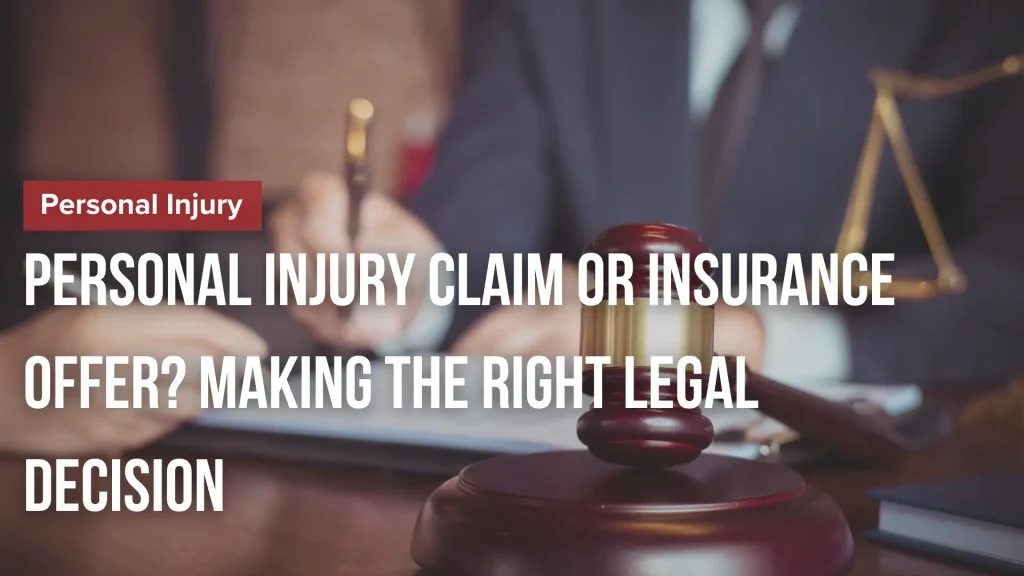
After an accident, deciding between accepting an insurance offer or filing a personal injury claim can feel overwhelming. Insurance companies often offer quick settlements, which can be beneficial because they give accident victims the money they need to manage their situation. However, understanding the dynamics of a personal injury claim vs. Insurance settlement is essential, as a settlement may not always reflect the full value of your injuries and losses.
A personal injury lawsuit can help an accident victim pursue maximum compensation. Yet the process can be intimidating and lengthy. Victims may not be prepared for the emotional toll a trial can take, which is why settling a personal injury claim with an insurance company can sometimes offer a quicker, less stressful resolution.
Before making any decisions, understanding your legal rights and the long-term impact of your injuries is essential. Exploring the key differences between insurance settlements and personal injury lawsuits can help you make the right legal decision for your situation.
Key Differences Between Insurance Settlements and Injury Lawsuits
After an injury-causing accident, there are two main paths to seeking fair compensation: accepting an insurance settlement or pursuing a personal injury lawsuit. While both options aim to recover compensation, they differ significantly in process, timing, and potential outcome. Some of the key differences between an insurance settlement and a lawsuit include:
Speed of Resolution
Insurance settlements are usually faster. An insurer may offer compensation soon after the accident. It is in their best interest to settle claims quickly and efficiently, moving on to the next issue. On the other hand, lawsuits can take months or even years to resolve, especially if the case goes to trial. The more complex the case, the longer it can take to resolve. Additionally, with a lawsuit, the judgment may be appealed, possibly extending the process.
Compensation Amount
Settlement offers from insurance companies are often lower than an award you might receive through a lawsuit. An insurance company is a for-profit business. Companies want to minimize payouts because it saves them money and benefits the bottom line. Lawsuits generally offer a pathway to greater compensation and allow victims to seek money for medical bills, lost wages, pain and suffering, and more.
Control Over the Outcome
In a settlement, you and the insurance company control the outcome by negotiating terms that are agreeable to both parties. Often, accident victims feel more involved in the process. The same is not always true for a personal injury lawsuit. Once a case heads to a judge or jury, the court decides the outcome, which can be less predictable.
Associated Costs
The costs associated with filing an insurance claim are minimal compared to those related to filing a personal injury lawsuit. Preparing for trial takes significantly more time and effort for an attorney than negotiating an insurance settlement. In addition to legal fees, court costs, expert witness fees, and other expenses, fighting a legal battle is more costly.
Legal Complexity
Settlements are generally straightforward and less formal. A personal injury lawsuit involves court procedures, filing deadlines, discovery, and possibly trial, making it more complex and time-consuming.
Privacy Concerns
Another key difference comes down to privacy. Settlement negotiations are typically private and confidential. Lawsuits are a matter of public record. If privacy concerns are an issue, an insurance settlement offers anonymity while a court case opens you up to potential public scrutiny.
Risk Assessment
While you may not recover full compensation, a settlement from an insurer can offer a predictable and safe outcome. Filing a lawsuit can involve some risk because there is the potential that a judge or jury may not rule in your favor.
Understanding these differences can help you decide the best option for your situation.
When to Accept a Settlement vs. When to File a Claim

How do you know when accepting a settlement or taking your case to court is better? Choosing one option over another can significantly impact your physical and financial recovery. Many people feel immense pressure when attempting to weigh their options. Things you should take the time to consider include:
When to Accept a Settlement
- When your injuries are minor, it may be better to accept an insurance settlement. Medical expenses associated with minor injuries typically fall within minimum insurance coverage limits.
- Accepting a settlement may also be best if your injuries are fully diagnosed and treated. At this point, you understand the extent of your injuries and won’t get shortchanged by accepting a settlement that doesn’t account for future medical costs.
- A fair settlement may follow quickly if liability is clear and uncontested and the insurer acknowledges responsibility.
- When the settlement offer adequately covers all losses, such as medical bills, lost wages, and property damage, it is worth accepting.
- You are in a vulnerable financial position and want to avoid a lengthy legal process. Settlements resolve much faster than lawsuits and avoid the stress of going to court.
When to File a Lawsuit
- When injuries are catastrophic, it is time to consider a personal injury lawsuit. Significant injuries can quickly exceed insurance policy limits, and an insurance settlement is rarely adequate. Considerable injuries require long-term medical care and future expenses, which an insurer may not include in a settlement.
- If injuries are severe or life-changing, a lawsuit may be a viable option for pursuing maximum compensation. A court may best address permanent disability, disfigurement, or injuries that cause quality-of-life issues.
- Insurance companies want to settle quickly and for as little as possible. A lawsuit is an option if you receive a lowball offer or the insurer won’t make an appropriate offer.
- If an insurance company denies your claim or delays payment, legal action may be necessary to compel payment.
- When disagreements over fault arise, litigation can help establish the facts and prove liability. A lawsuit may also be the best option when multiple parties are at fault for causing an accident.
Let an Experienced Personal Injury Attorney Advocate for You
At Tamaki Law, our skilled personal injury attorneys in Washington State have advocated for Washington accident victims for over 30 years. Our team is here to help you understand your rights and take the first step toward securing the necessary benefits. We put your needs first. We aim to find legal solutions that address your concerns and help you pursue maximum compensation for your injuries.
Contact us online or call our office now at (800) 801-9564 to request a free legal consultation.
